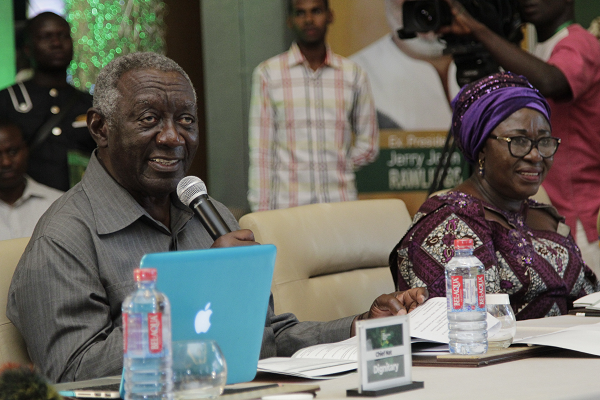
Kufuor rues ageing cocoa farmer population
Former President, John Agyekum Kufuor, has expressed deep concern about the country’s ageing cocoa farmer population, pointing out that the situation does not auger well for the sustainability of the cocoa sector.
As chairman for the maiden Green Ghana Lecture series of the Kuapa Kokoo Co-operative Farmers and Marketing Union Limited in Accra last Wednesday, Mr Kufuor said, “According to the COCOBOD, the average age of the cocoa farmer in Ghana is 51 years as of 2015, which is not good for a country with a youthful population as ours.”
The lecture, which attracted players in the cocoa industry, including farmers, was on the theme; “Empowering and attracting the second generation farmers in a Ghana Beyond Aid,” and was organised with the support of Millennium Promise Alliance, an international non-profit organisation committed to accelerating the achievement of the Sustainable Development Goals and the eradication of extreme poverty, hunger, and preventable disease.
Cocoa and Ghana
Mr Kufuor said he was happy that his government, between 2001 and 2008, instituted very ambitious and sustainable policies that had revamped the cocoa industry.
“The mass cocoa spraying exercises, the subsidised fertilisers, the upgrade of the farmers’ price among others, have led to an increase in cocoa production,” he said, and added that the present government was also instituting pragmatic policies to revamp the cocoa sector.
“Cocoa is the mainstay of Ghana’s economy and has been since the colonial era, in fact from the 1920s. Today, Ghana produces up to 800,000 tons of premium cocoa annually, second globally only to Cote d’Ivoire.
“This combination of history and economic reputation now as a lower middle income country places cocoa at the centre of the Ghanaian agricultural identity,” Mr Kufuor said and commended Kuapa Kokoo for the path that it was charting.
The former President also congratulated Kuapa Kokoo for establishing strong systems that had been resilient over the years and had led to their attainment of 25 years in the cocoa industry.
Mr Kufuor said instituting the Green Lecture series would engender debates and create a platform where ideas would be shared to make the cocoa industry even better.
Young women in cocoa farming
Reacting to the former President’s concern about the ageing farmer population in her welcome address, the President of Kuapa Kokoo, Madam Fatima Ali, said having realised on her assumption of office that only 35 per cent of the over 100,000 cocoa farmers were women whose ages averaged 50 years, a project was designed in 2016 to attract young women into farming.
Known as the Young Women in Cocoa Production Project (YWCP), she said the project was currently being piloted in five selected areas in Kuapa Kokoo’s catchment area and was designed to capture both educated and uneducated women into cocoa farming.
Under the project, young women are sensitised to entrepreneurship, farming as a business, farmland acquisition, as well as other opportunities in cocoa farming and also equipped with knowledge and skills to deal with cultural barriers.
Madam Ali said the project, which was financed from Kuapa’s own resources, “fits well with the national drive to support youth in cocoa production,” and added that it enabled them to secure improved and high-yielding cocoa pods from COCOBOD for the establishment of nurseries.
She said young women in the pilot areas had already begun making gains and becoming self sufficient from proceeds of their farms which included other crops. She, therefore, urged Mr Kufuor to help Kuapa advance its agenda of encouraging young women to go into agriculture and farming.
Green lecture
The Country Director of Millennium Promise, Chief Nat Nsarko, said the lecture series, which would be held annually, was aimed at bringing together all stakeholders in agribusiness to dialogue on how best to move the sector forward “to improve yields in the country if indeed we need a Ghana Beyond Aid.”
It will also seek to explain the various agricultural policies by the government for informed implementation by farmers who often do not understand those policies.
“The series is not a talk shop but an engine room where ideas will be shared and challenges such as post harvest losses and issues concerning pests will be dealt with,” he said.
